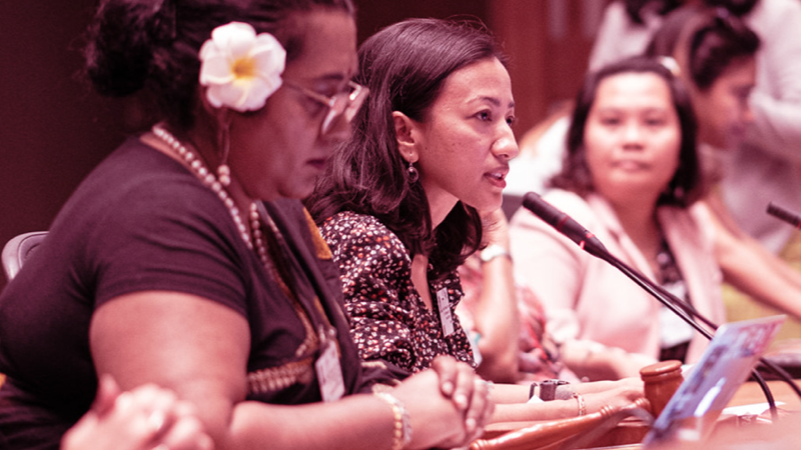About the series
The COVID-19 outbreak has uncovered pressure points impacting women and girls across an array of key issues including rise of gender-based violence and inequality, increased risks faced by female health workers on the frontline of the fight, and limited access to sexual and reproductive health services.
This series, produced in partnership with Devex, Facebook and WFP, is designed to create a better understanding of the gender-related issues highlighted by the current pandemic and to share important lessons learned about how data can help inform better responses to the current crisis.
Events

Speakers
Tara Cookson, Ladysmith
Emily Courey Pryor, Data2X
Papa Seck, UN Women
Moderator: Kelli Rogers, Devex

Speakers
Caitlin Augustin, DataKind
Roopa Dhatt, Women in Global Health
Pamela McQuide, IntraHealth
Moderator: Jessica Abrahams, Devex

Speakers
Anne Connell, Equal measures 2030
Jo Hemmings, Girl Effect
Scheaffer Okore, Development Advisor
Moderator: Jessica Abrahams, Devex

Speakers
Paula Gonzalez Martinez, World Bank
Pamela Bella Nyamutoka Katooro, International Institute of Rural Reconstruction
JW Schneider, Facebook
Sreelakshmi Papineni, World Bank
Moderator: Kelli Rogers, Devex

Speakers
Sunita Grote, UNICEF Innovation (Venture) Fund
Safeena Husain, Educate Girls
Hamzat “Hamzy” Bala Lawal, Connected Development
Laban Onisimus, Plan International Nigeria
Moderator: Emma Smith, Devex

Speakers
Emily Janoch, CARE
Henriette Jansen, UNFPA Asia and the Pacific Regional Office
Laura Scanlon, Maido
Moderator: Kelli Rogers, Devex

Speakers
Sean Mayberry, StrongMinds
Sarah Mosely, International Rescue Commitee
Mwende Mwendwa, Mental and Emotional Wellness Practitioner
Moderator: Emma Smith, Devex

Speakers
Norah Bagirinka, public speaker & advocate for women and children’s rights
Christelle Cazabat, researcher, Internal Displacement Monitoring Centre
Devon Cone, Refugees International
Federico Soda, IOM
Moderator: Rebecca Root, Devex

In addition to the challenges facing women’s health during this pandemic, this event will look at how data can be used to improve access to SRHR services. It will also explore the role of data in ensuring strong supply chains for life-saving drugs and contraceptives.
Speakers
Raman Shrestha, Marie Stopes International
Dr. Renae Stafford, Touch Foundation
Emily Thacher, mPharma
Paulin Tra, International Planned Parenthood Federation Africa
Moderator: Natalie Donback, Devex

Join us as we take stock of insights from the Gender Data event series and shine a light on some of the crucial next steps and the role of data in solving some of the challenges facing women and girls today.
Speakers
Laura McGorman, Facebook
Eileen Mokaya, Pathfinder
Juan Daniel Oviedo, National Administrative Department of Statistics, Colombia
Agnieszka Rawa, Millennium Challenge Corporation
Moderator: Jessica Abrahams, Devex
Resources Hub
Produced by
Devex
Devex is the media platform for the global development community. A social enterprise, we connect and inform over one million development, health, humanitarian, and sustainability professionals through news, business intelligence, and funding & career opportunities so you can do more good for more people.
Event Partner
Facebook builds technologies to give people the power to connect with friends and family, find communities and grow businesses. Working with gender equality organizations and experts, we help provide real-time and representative data and close the gender data gap. Our goal is to increase the availability and use of gender data, which is critical to guiding the development of inclusive policies, programs and services, and for tracking progress on achieving gender equality.
Content Partner
World Food Programme (WFP)
The World Food Programme (WFP) is the world’s largest humanitarian agency fighting hunger worldwide. On average, WFP aims to bring food assistance to more than 80 million people in 75 countries. As the United Nations frontline agency in the fight against hunger, WFP is continually responding to emergencies. But WFP also works to help prevent hunger in the future. They do this through programmes that use food as a means to build assets, spread knowledge and nurture stronger, more dynamic communities. WFP has developed expertise in a range of areas including Food Security Analysis, Nutrition, Food Procurement and Logistics to ensure the best solutions for the world’s hungry.
Get in touch
If you are interested in organizing similar online events with Devex, please send us an email at [email protected]









